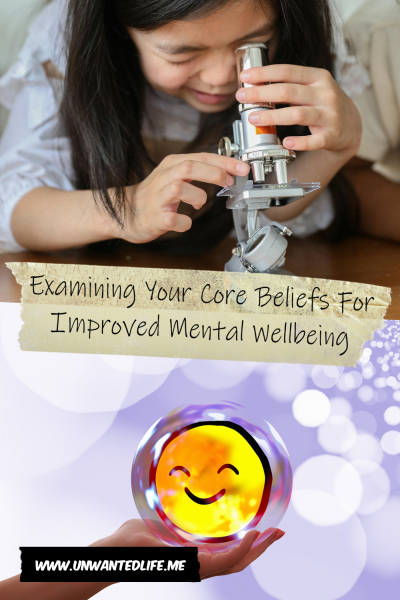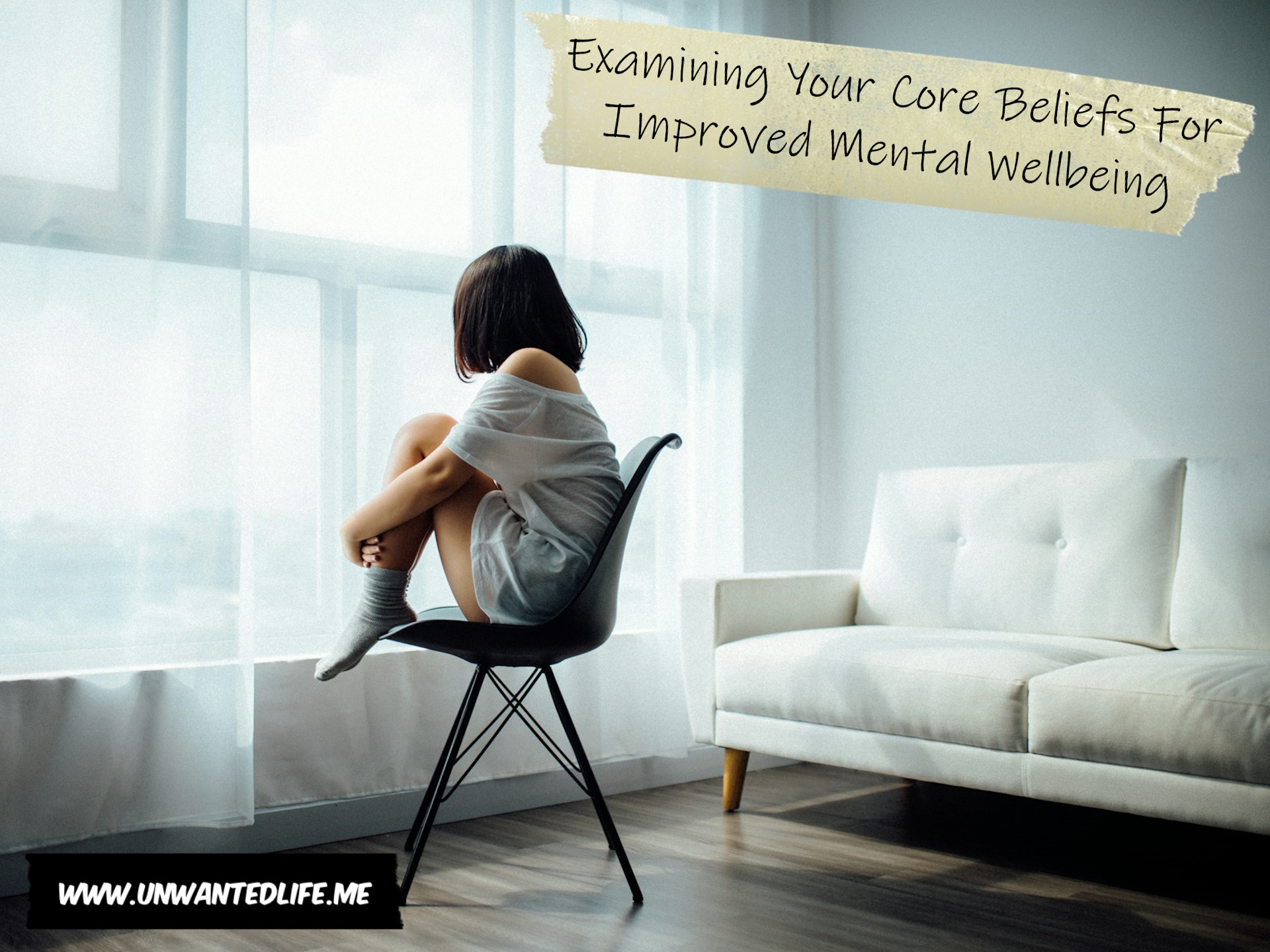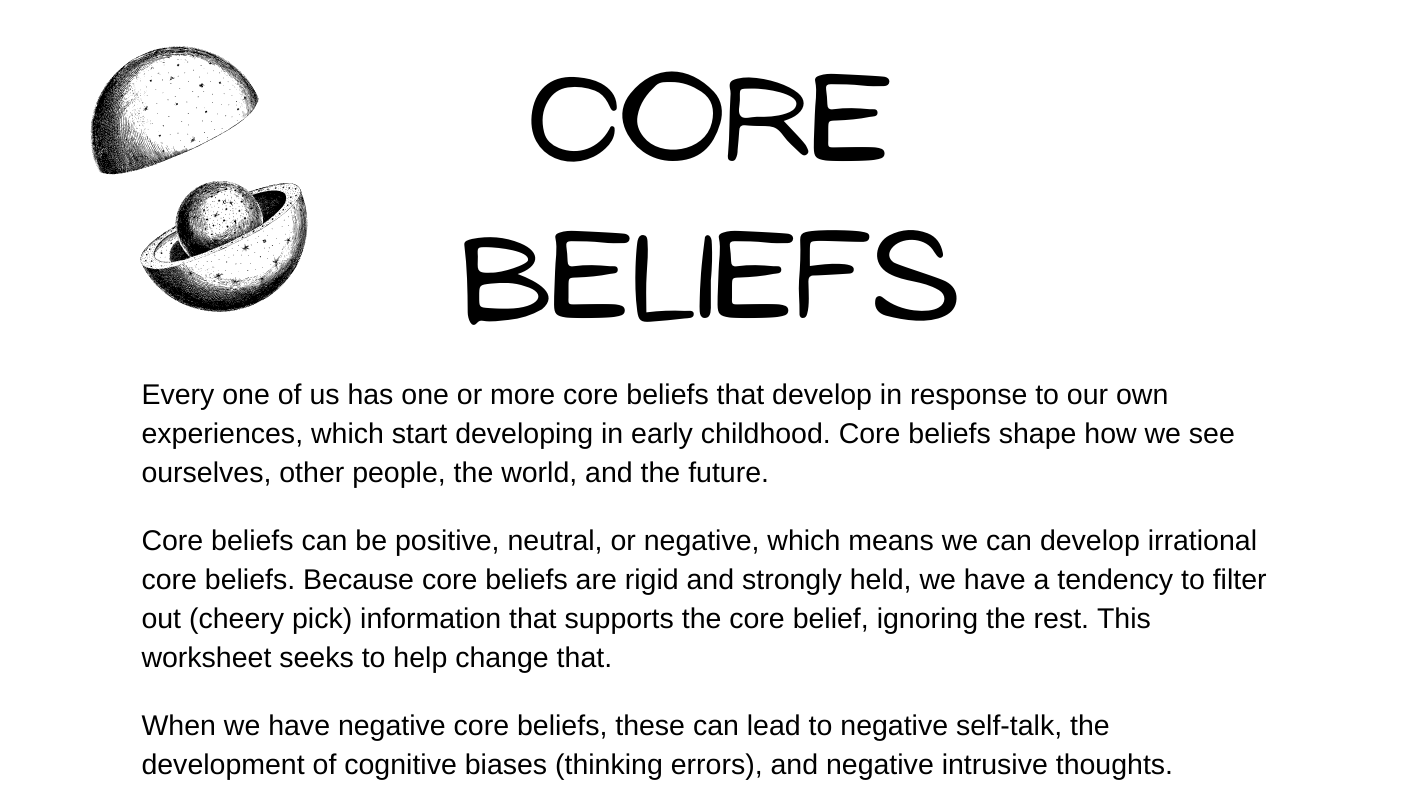Core beliefs play a vital role in our lives, yet not many people are aware of them, which isn’t a surprise if you’ve never had therapy or haven’t studied psychology or counselling. To help spread that awareness, I present to you this article. I hope you find it informative.
Disclosure: This article contains links to my Unwanted Life Shop. Read my full disclosure here.
What Are Core Beliefs?
According to Verywell Mind, our core beliefs develop as a result of our experiences throughout our lives, starting in childhood. These beliefs grow and change as we grow and change, affecting how we see ourselves and the world around us.
Core beliefs are the fundamental assumptions we hold about ourselves, the world, and other people. They are deeply ingrained and often subconscious, shaping how we perceive our experiences and interact with the world. Wenzel (2012) and Millings and Carnelley (2015) also made a case for a fourth dimension, the beliefs could also be about the future.
Core beliefs are also suspected of causing common mental health issues (Millings and Carnelley, 2015), which makes sense to me. I developed such negative beliefs as a result of the racism I experienced as a child. So it doesn’t surprise me that these negative beliefs might come before conditions like depression. Treatment that targets these negative beliefs also has far better recovery outcomes, at least in my experience.
Positive beliefs
These beliefs empower us and contribute to a healthy sense of self. An example of positive beliefs are, “I am lovable” and “I am capable”.
Negative beliefs
These beliefs limit our potential and can lead to negative emotions and behaviours. An example of a negative core belief is how you might think, “I am worthless” and “I am not good enough”.
What Are The Three Main Camps Of Core Beliefs?
Beliefs about yourself
Beliefs about ourselves can develop at any time, but more often than not, unhelpful negative beliefs about ourselves are rooted in early experiences (Branch and Willson, 2021). For me, it was a result of racist abuse as a child, but it can also come from something like, but not exclusive to, harsh criticism from a loved one and neglect.
Beliefs about other people
Negative core beliefs about other people usually develop because of traumatic incidents involving other people (Branch and Willson, 2021). This traumatic event can be anything from domestic abuse or witnessing someone being harmed in some way. These negative beliefs about others may not always develop because of one traumatic event, but could be the result of several.
Beliefs about the world
An example of this is how someone could become fearful of the world, as they’ve grown to see that the world is dangerous or full of bad people. Thus, people who’ve experienced trauma, like living through severe deprivation and surviving harmful, insecure, unpredictable environments, are at greater risk of forming negative core beliefs about life and the world (Branch and Willson, 2021).
How Negative Core Beliefs Affect You
Your core beliefs act like a filter through which you interpret events and experiences. For instance, if you believe you’re unlovable, a minor rejection might confirm that belief. This can often work in conjunction with cognitive biases that develop because of such negative beliefs. Therefore, if you have a negative core belief and also have the ‘filtering out the positives’ cognitive bias, then you’re going to ignore items that prove your negative core belief wrong.
Your core beliefs influence your emotional responses to situations as well. So, if you have these kinds of negative beliefs, then this can mean they might trigger anxiety, sadness, or anger in situations that you wouldn’t otherwise expect them to be triggered.
These same negative beliefs will also affect your behaviours and decision-making as well. For example, a belief in your capabilities might motivate you to pursue challenges, while a belief that you fail at everything you do (fear of failure) might hold you back.
According to Millings and Carnelley (2015), the same negative beliefs as, “I’m worthless” or “I’m a failure” are key diagnostic features for identifying depression.
How Having Healthy Core Beliefs Affects You
Mental and emotional wellbeing
Positive core beliefs contribute to better mental and emotional wellbeing, while negative ones can increase vulnerability to mental health issues.
Relationships and success
Having healthy core beliefs fosters stronger relationships and a greater sense of personal achievement. Certainly important for people like me with borderline personality disorder (BPD).

Overcoming Your Negative Core Beliefs
While core beliefs are often formed early in our lives, they are not set in stone. As such, there are ways to overcome maladaptive or negative beliefs that are causing our quality of life to suffer.
Reflect on automatic thoughts
Pay attention to your inner critic and the negative thoughts that pop into your head frequently. These might be rooted in core beliefs. A good way to track such thoughts is to keep a journal of those thoughts. Journaling like this can help identify themes and what triggers the thoughts as well.
Early memories
Consider your earliest memories and how they shaped your perception of yourself and the world. Working on restructuring these memories can help tackle core beliefs (Wenzel, 2012), such as applying thought challenges to these memories. This can lead to positive changes in those beliefs.
Values and fears
Analyse your core values and what you fear most. These can often be connected to core beliefs.
Therapy
To help tackle negative core beliefs, seeking professional help can be very effective. There’s no shame in wanting to improve your quality of life by seeing a therapist.
Thought challenges
Several thought challenges can be used in tackling negative core beliefs and associated negative thoughts to aid in replacing them with healthy ones. There’s ‘putting your thoughts on trial‘, ‘silver lining‘, and ‘reframing‘.
My Core Beliefs Workbook
My core beliefs workbook has been created to combine elements from cognitive behaviour therapy (CBT), such as ‘downward arrowing’. The downward arrow technique is a fairly straightforward exercise to help people identify their potential negative beliefs (Millings and Carnelley, 2015). The workbook will then provide you with exercises to help replace these harmful beliefs with healthy ones.
You can find my workbook in my shop by clicking here.
Summary
Understanding your core beliefs is a powerful tool for self-awareness and personal growth. If you find negative beliefs impacting your life, seeking professional help can be extremely beneficial, but my workbook might be a good place to start.
By exploring your negative beliefs, you can gain a deeper understanding of yourself and take steps to cultivate a more positive and empowering outlook on life.
Replacing negative core beliefs with healthy ones adds to our flexibility, resilience, and sense of kindness, which decreases the activation of automated negative thoughts in situations that would normally trigger us (Wenzel, 2012).
As always, leave your feedback in the comments section below. Also, please share your experiences with examining your core beliefs in the comments section below as well. Don’t forget, if you want to stay up-to-date with my blog, you can sign up for my newsletter below. Alternatively, click the red bell icon in the bottom right corner to get push notifications for new articles.
Lastly, if you’d like to support my blog, then there are PayPal and Ko-fi donation payment options below. Until next time, Unwanted Life readers.
References
Branch, R., & Willson, R. (2021). Core Beliefs and Cognitive Behavioral Therapy For Dummies. Dummies. Retrieved from https://www.dummies.com/article/body-mind-spirit/emotional-health-psychology/psychology/cognitive-behavioral-therapy/core-beliefs-and-cognitive-behavioural-therapy-267188.
Millings, A., & Carnelley, K. B. (2015). Core belief content examined in a large sample of patients using online cognitive behaviour therapy. Journal of Affective Disorders, 186, 275-283. Retrieved from https://shura.shu.ac.uk/27569/2/Millings%20%26%20Carnelley%20published.pdf and https://www.sciencedirect.com/science/article/pii/S0165032715303025.
Wenzel, A. (2012). Modification of core beliefs in cognitive therapy. Standard and innovative strategies in Cognitive Behavior Therapy, 17-34. Retrieved from https://citeseerx.ist.psu.edu/document?repid=rep1&type=pdf&doi=5d2fc1326a56b7cd6408c4a7e8ae87f34fb1b922.




Love this post.. I focus so much on core beliefs in the context of limiting beliefs since the beliefs about: I am or not XXX kind of person, the world is XXX are so powerful in terms of how we view ourselves and the world. We learn these or experience things that give us these beliefs but the important part is that if we’re aware of them we can change them 🙂 Very informative. Great post as always!
Exactly. Thanks for commenting
I’ve seen some childs have beliefs grown from their parents and people they see as mentor and close. This is interesting to know about it. And agree with you, it changes as we grow.
Thanks for commenting
Great post! I think it’s so important to understand your values and beliefs – and it’s great to see how it can help you improve your mental health. Thank you for sharing 🙂
Core beliefs shape how we perceive the world around us and ourselves, so if we have maladaptive or negative core beliefs, then we’re going to perceive ourselves and the world in a negative way
Thank you for this in-depth post about core beliefs, and especially for sharing some ways to overcome negative core beliefs. I think I definitely have some but it’s a relief to know that they are not set in stone and there are things I can do to overcome them.
With time and effort, anyone should be able to change their negative or maladaptive core beliefs for ones that’ll improve their quality of life. Thanks for commenting
Absolutely agree! What we deeply believe about ourselves and the world around us can really impact how we feel. Having positive beliefs can lift our mood and help us handle tough times better. Thanks for sharing your insights and tips on how to deal with negative beliefs. It’s super helpful!
Exactly. Thanks for commenting